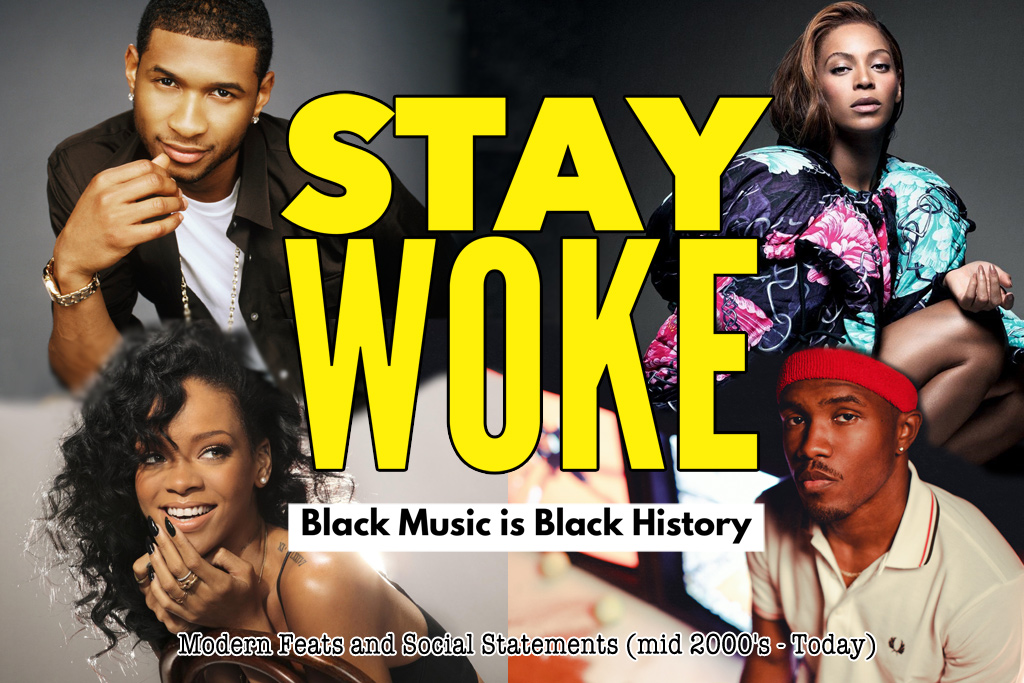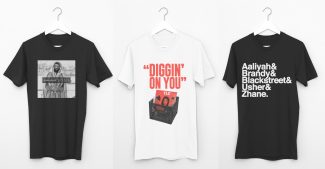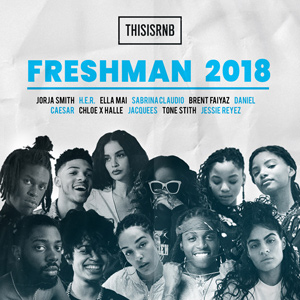The early 2000s was sort of a low point for R&B music. We were losing our footing in the mainstream global market as our biggest artists from the previous decade began to lose relevance due to career or personal missteps (ex. Janet – Superbowl, Whitney – drug accusations, Mariah – Glitter, Michael Jackson – second child molestation accusation, Boyz II Men – decline, lose a member). Meanwhile, pop and Hip-Hop music began to take its place with the commercial success of acts like Britney Spears, N’SYNC, Christina Aguilera, Nelly, Ja Rule and 50 Cent. We don’t see a resurgence of R&B music until the middle of the decade with the meteoric success of one album.
2004. The year Usher single handedly put R&B music back on the map. March 23, 2004 saw the release of his album, Confessions and it saw Usher go from R&B star to a global phenomenon. Bolstered by the incredible success of lead single “Yeah!,” which was No. 1 for an incredible 12 weeks, the album sold an astounding 1.1 million copies in its first week. That total is the highest-ever first week sales by an R&B artist and the second-highest first week sales ever for a male artist. The album would eventually be certified diamond (sales of 10+ million) in the US and worldwide sales would exceed 20 million copies, it is one of the biggest selling albums of all time. The album also had three more No. 1 singles released (“Burn,” “Confessions Pt. II,” and “My Boo”) bringing the total to four No. 1 Billboard Hot 100 singles from one album. The second single, “Burn” would replace “Yeah!” at No. 1 and spend eight non-consecutive weeks at the top of the chart. By year end, “Yeah!” and “Burn” were 2004’s top best-selling singles of the year at number 1 and 2 respectively. According to Billboard, this was the first time an artist has achieved this since 1964 with The Beatles! For the first time in a while, an R&B artist had the biggest and most successful album of the year. But it would not end there.
In the following year, we see an unexpected artist take over the music scene and stage a comeback the music industry hadn’t seen before. It started with the release of “It’s Like That” in January 2005, when we see Mariah Carey have her first Billboard Top 20 hit in years. The song didn’t do “90’s Mariah” numbers (it “only” peaked at No. 16) but after being completely absent from the Billboard charts for two years, Mariah finally had a hit but that would be an understatement once she released her next single and subsequent album. The Emancipation of Mimi was the album released in April 2005 and it debuted at No. 1 with the biggest first week sales of her career at that time. She hadn’t had a No. 1 album since 1997’s Butterfly and it was thanks to the song that rejuvenated her career, “We Belong Together.” The song was No. 1 on the charts for 14 weeks, matching the second longest run ever at No. 1 and was dubbed the Song of the Decade (2000-2009), a credit she earned before in the ’90s with “One Sweet Day,” the longest running No. 1 single ever with 16 weeks. Her next single, “Shake It Off,” would peak at No. 2 but that was because she was busy hogging the No. 1 spot at the same time with “We Belong Together.” It would mark the first and only time in Billboard music history that a female artist occupied the top two spots on the chart as a lead artist. The album’s fourth single, “Don’t Forget About Us” would become Mariah’s 17th No. 1 hit, tying her with Elvis for most ever as a solo artist. After going 5 times platinum in the US, Mariah had the best-selling album of the year, the first time a solo female artist did that since 1996. Not bad for an artist who was bought out of their previous contract due to low sales and whose career was declared dead.
But Mariah Carey wasn’t finished. After winning 3 Grammys for her work on The Emancipation of Mimi, Mariah released 2008’s E=MC2. The album debuted at No. 1 and gave MC her biggest first week sales ever and spent two consecutive weeks at No. 1, which her albums hadn’t done since 1995’s Daydream. The album’s first single, “Touch My Body” was a fun, catchy song with a video showing a comical side to Mariah which we hadn’t seen before. The song itself would become her 18th No. 1 single, giving her the record of most No. 1 songs by a solo artist and second overall behind The Beatles (20). Additionally, she tied Elvis with most weeks at No. 1 on the Hot 100 with 79 cumulative weeks. It was a crowning achievement for the artist and for the genre.
2008 was also the year Beyoncé released her third album, I Am…Sasha Fierce. Once the lead singer of girl group Destiny’s Child, she had become a prominent artist in her own right and a budding legend in the making. Lead single, “Single Ladies (Put A Ring On It),” became the biggest song of her career and a global phenomenon with its iconic video inspiring countless parodies. The success of her album and singles (“Single Ladies (Put A Ring On It),” “Halo,” and “If I Were A Boy”) garnered Beyoncé ten Grammy nominations, tying Lauryn Hill for most nominations in a single year by a female artist and she won a record-setting six Grammys in one night, the most awards won in one night by a female artist. Beyoncé would continue to break records and set the standard from the aughts to today by breaking concert and touring records as a live act, becoming the most nominated woman in Grammy Award history, and becoming the first artist in Billboard history to have their first six albums debut at No. 1 with her 2016 album, Lemonade. More on that album later.
As we head into the 2010’s decade there was only one other prominent global R&B artist and her name was Rihanna. With her blend of R&B, pop, Hip-Hop and reggae, Rihanna has become one of the best selling artists of all time with over 230 million records sold worldwide. Her accomplishments include: 14 No. 1 singles, third most; 31 top ten Billboard Hot 100 hits – third most ever and the only black artist with at least 30 top 10 hits; 22 top 5 Billboard Hot 100 hits – fifth most; the first and only artist to surpass 100 million cumulative single sales according to the RIAA; and a Guiness and Billboard record for most No. 1 songs in a single calendar year for a solo female artist with 4 in 2010. There isn’t a single era or time frame to really focus on when it comes to Rihanna because she’s been consistently dominating the charts and global music for over a decade. There isn’t a “peak.” To quote her song, “Bitch Better Have My Money,” she sings: “Every time I drop I am the only thing y’all playing.” Indeed, Rihanna.
Both Rihanna and Beyoncé would carry the mantle of R&B music from the 2000s into this current decade and remain the only successful global, superstar icons in the genre today. We would see music begin to shift in the late 2000s as the introduction of autotune gave rappers the unfortunate encouragement to sing, which meant R&B-pop singers were no longer as relevant. A quick look at today’s Billboard charts prove that Hip-Hop is now pop music and somehow R&B has lost its place in the forefront. We saw R&B artists transition to more dance, EDM, Euro-pop music as the genre began to lose commercial viability, only to come back once it became clear that those quick hit singles didn’t translate to album sales. R&B music still hasn’t quite recovered, with many people proclaiming the genre to be “dead.” But the “death of R&B” has seen underground artists and relative new-comers like Jhené Aiko, Tinashe, SZA, Miguel and The Weeknd revitalize the genre with what’s called “alt-R&B” which is an eclectic mix of alternative, rock, trap, Hip-Hop, funk and R&B music to create a sound that’s fresh yet also hearkens to the traditional sounds of R&B music in the ’70s and ’80s.
At the same time, the political and social events of recent years have influenced the subject matter of R&B music. The music hasn’t been so overtly political since the ’70s when artists like Stevie Wonder and Marvin Gaye were at their peak. Hip-Hop took its place and became the voice of black youth in the late ’80s and ’90s, taking on the mantle of being political commentators on racism, police brutality, drugs and gang violence. By that time, R&B music had become too commercial to relate and convey the conditions of everyday Black life in an authentic way. But times have changed. R&B artists had something to say and with their voices they would motivate and inspire social/political movements.
In 2012, a relatively unknown artist would drop a critically acclaimed album that would forever change representation in black music. That album was Channel Orange by Frank Ocean. Before its release, Frank Ocean was just another up and coming R&B artist and after its release he would become one of the genre’s most prominent and influential stars. What made Channel Orange such a huge statement was not just the incredible, timeless music but his discussion of same-sex love. Never before has a black LGBT artist been given the platform to speak their truth and have success while doing it. It was a revolutionary moment for the black community. It has long been kitchen table talk in the black community if R&B and Hip Hop would ever be accepting of openly LGBT people and Frank Ocean made that answer a resounding yes. It is no coincidence that in subsequent years we see more male and female LGBT rappers and singers than ever before on the Billboard charts and in shows like “Love and Hip Hop.” Before Channel Orange, black queer politics had no space in Black music let alone in mainstream media and now it’s a different story.
2012 was also the year Trayvon Martin was wrongly gunned down and killed by George Zimmerman. The incident sparked discussions of racial profiling that got louder and louder as more and more unarmed black men were killed by the hands of the police in the years since. Trayvon Martin’s death forever changed the discussion of race in America and was the spark for political/social activism in the Black community (namely the Black Lives Matter movement) and the start of the “Stay Woke” movement, a movement about recognizing the mistreatment and abuses of the Black community. It all came to a head in 2016. The Black Lives Matter movement was criticized and deemed a hate group by some on the right wing and Donald Trump would be declared President of the United States. It has been a trying, stressful and hurtful few years for the Black community at the realization that racism is alive and well and more overtly prominent than it has ever been in recent memory.
No album better speaks to the frustrations and daily situations of black people than Solange’s A Seat At The Table. Released in September 2016, Solange Knowles manages to escape the shadow of her sister Beyoncé to deliver one of the most critically acclaimed, honest and blackest albums of the year. From singing about black hair politics in “Don’t Touch My Hair” to depression in “Cranes in the Sky” to addressing the angry black woman stereotype in “Mad” to highlighting black resilience in “Scales,” Solange released an album that addressed the needs and concerns of the Black community. It provided solace, comfort and a safe haven in a time where Neo-Nazis were incited to publicly taunt and harass Black Americans. Yes the album was a commercial success and gave Solange her first Grammy but its impact is more important and can still be felt today. When Trump was elected, nothing was more reassuring and comforting than playing “FUBU” and hearing Solange say, “all my niggas got the whole wide world.” ✊?
Sister Beyoncé, also released an album in 2016 called Lemonade. Since 2011’s 4 album, Beyoncé has been making music that is more overtly political in nature. 2013’s self-titled Beyoncé album saw the icon address feminist issues like the political and social equality of the sexes, sexual freedom, motherhood and beauty standards. But Lemonade, is her most critical and controversial political statement yet. The album discusses the trials and tribulations of a relationship, the power of forgiveness with the theme of taking life’s lemons and turning them into lemonade. The visual album expounded upon that idea but made the notion very clear. Beyoncé was able to forgive Jay-Z and his cheating and found the strength to move on because she is a black woman. She’s found her strength and source of pride from being a Black woman, the Black women around her and the history of the Black women in this country. The pro-black message isn’t that obvious on the record but it’s Beyoncé’s actions that speak louder than words and resonated with Black women all over. She explored black feminism in a historical, nuanced way that inspired pride in the Black community. Although she could’ve taken the safe route and appeased her conservative fan base by just sticking to singing and dancing, her affirmation of self was a inspirational message to Black people to love ourselves, our community in spite of any adversity.
I found it necessary to end this series on Beyoncé because she’s the epitome of Black Girl Magic. No better artist represents the commercial viability and political sustenance of R&B music today than Beyoncé and it’s unlikely anyone else in this generation will. She is the GOAT of our generation. Bow Down.
Timeline:
2004 – Usher releases the Confessions album – biggest first week sales by an R&B artist ever.
2005 – Mariah Carey releases the Emancipation of Mimi album.
2008 – Mariah Carey has her 18th #1 hit with “Touch My Body” – the most ever by a solo artist.
2010 – Beyoncé breaks the record for most Grammy wins by a female artist in one night.
2010 – Rihanna sets the record for most #1 singles in a calendar year by a solo female artist with hit singles – “Rude Boy,” “Love the Way You Lie,” “Only Girl (In the World),” and “What’s My Name.”
2012 – Frank Ocean releases the Channel Orange album.
2016 – Solange Knowles releases the A Seat At The Table album.
2016 – Beyoncé releases the album and visual album Lemonade.
2017 – Rihanna releases “Love on the Brain” – her record breaking 30th Top 5 hit, making her the only black artist with 30+ Top 5 hits.
I hope you’ve found the history of R&B music exciting and insightful. As you can see, the genre is far from dead as it incites social/political conversations that inspire the world and still has a strong place in mainstream music today. Remember Black Music is Black History, celebrate it every day. Stay Woke ✊?





1 Comment